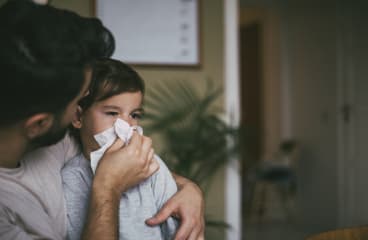
Overview
Hand-foot-and-mouth disease is a common illness caused by a virus. The virus is very contagious. It spreads easily through contact with stool, coughs, sneezes, and runny noses. Anyone can get hand-foot-and-mouth disease, but it's most common in children.
Symptoms are usually mild. They often start with a mild fever, a poor appetite, and a sore throat. In a day or two, blisters or sores may form in the mouth, on the hands and feet, and sometimes on the buttocks. Mouth sores or blisters are often painful and may make it hard to eat. Not everyone who gets infected has symptoms.
Home care can help relieve the symptoms. They usually go away in about 7 to 10 days. This illness is caused by a virus, not bacteria, so antibiotics won't help.
Hand-foot-and-mouth disease is not the same as foot-and-mouth disease (or hoof-and-mouth disease), which occurs in animals.
Follow-up care is a key part of your child's treatment and safety. Be sure to make and go to all appointments, and call your doctor if your child is having problems. It's also a good idea to know your child's test results and keep a list of the medicines your child takes.
How can you care for your child at home?
- Make sure your child gets extra rest while they're not feeling well.
- Have your child drink plenty of fluids. If your child has kidney, heart, or liver disease and has to limit fluids, talk with your doctor before you increase the amount of fluids your child drinks.
- Do not give your child acidic foods and drinks, such as spaghetti sauce or orange juice. These things may make mouth sores more painful. Cold drinks, flavored ice pops, and ice cream may soothe mouth and throat pain.
- Ask your doctor if you can give your child acetaminophen (Tylenol) or ibuprofen (Advil, Motrin) for fever, pain, or fussiness. Be safe with medicines. Read and follow all instructions on the label. Do not use ibuprofen if your child is less than 6 months old unless the doctor gave you instructions to use it. Do not give aspirin to anyone younger than 20. It has been linked with Reye syndrome, a serious illness.
- Do not give your child two or more pain medicines at the same time unless the doctor told you to. Many pain medicines have acetaminophen, which is Tylenol. Too much acetaminophen (Tylenol) can be harmful.
- Watch for and treat signs of dehydration, which means that the body has lost too much water. As your child becomes dehydrated, thirst increases, and the mouth may feel very dry. Your child may have sunken eyes with few or no tears when crying. Your child may also lack energy and want to be held a lot. And your child won't need to urinate as often as usual.
- Take steps to avoid spreading the virus.
- Keep your child out of group settings, if possible. If your child goes to day care or school, talk to staff about when your child can return.
- Wash your hands after you use the toilet or change a diaper and before you touch food. Teach your child to wash their hands after using the toilet and before eating. Use soap and water, and scrub for at least 20 seconds. Or use an alcohol-based hand sanitizer.
- Teach your child to cover their mouth when they cough or sneeze.
- Do not let your child share toys or give kisses while your child is infected.
When should you call for help?
Call your doctor now or seek immediate medical care if:
- Your child has a new or worse fever.
- Your child has a severe headache.
- Your child cannot swallow or cannot drink enough because of throat pain.
- Your child has symptoms of dehydration, such as:
- Dry eyes and a dry mouth.
- Passing only a little urine.
- Feeling thirstier than usual.
Watch closely for changes in your child's health, and be sure to contact your doctor if:
- Your child does not get better as expected.
Where can you learn more?
Go to http://www.healthwise.net/patientEd
Enter J618 in the search box to learn more about "Hand-Foot-and-Mouth Disease in Children: Care Instructions".
Current as of: September 30, 2025
Author: Ignite Healthwise, LLC Staff
Clinical Review Board
All Ignite Healthwise, LLC education is reviewed by a team that includes physicians, nurses, advanced practitioners, registered dieticians, and other healthcare professionals.

